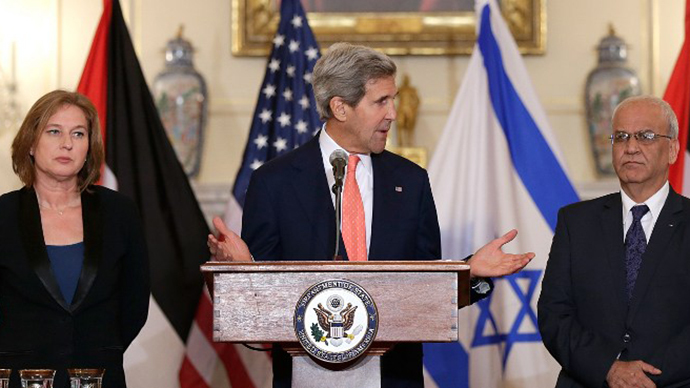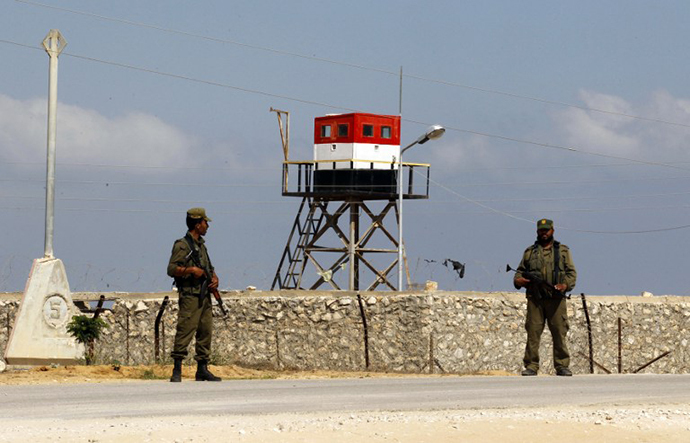John Kerry’s Israeli-Palestinian talks are a cover for aggression and annexation

The so-called “peace talks” initiated by John Kerry between Israel and the Palestinian Authority are meaningless theatrics that are part of a stratagem concealing and obscuring the real intentions of the US and Israel in the Middle East.
When US President Barak Obama went to visit Israel, in March 2013, the peace talks were not even a priority for his administration. The world was bluntly told by Obama that the so-called “peace process” was not even on the agenda for discussion between the US and Israeli governments. Hence, the big question on a lot of minds: why have the talks become a priority for the US government now?
The “peace talks” illusion
The main purpose of the so-called peace process has been to serve as a theatrical distraction. Initially, the Israeli-Palestinian talks were used to keep the Palestinian people and Arabs at bay. The peace talks and negotiations acquired another dimension with time, when they became a convenient tool for distracting the international public and influencing global public opinion by presenting Israel as a reasonable entity willing to make concessions for peace and security.
On the latter point mentioned above, on the concept of “Israeli concessions” to the Palestinians, there is a catch. Israeli concessions only exist in theoretical terms if Israel’s illicit fancies are considered legitimate. In reality, there are no Israeli concessions, especially when international law is the measuring stick to evaluate the Israeli-Palestinian conflict. Tel Aviv unlawfully claims the entire West Bank, which it has no legal entitlement to under international law, as its own territory. Israeli leaders present the attenuation of their territorial claims on the West Bank, which they have been busy annexing during the bogus peace talks, as some type of concession to the Palestinians.
The so-called “Israeli settlements” in East Jerusalem and the West Bank are categorically rejected by the United Nations as illegal. They are a brazen violation of international law. Israel’s settlements in the West Bank have unanimously been identified as a war crime under the 1998 Rome Statute of the International Criminal Court by all of the International Criminal Court’s judges. The US is also an accomplice in this, because Washington has prevented international action from being taken against Israel. A spade should be called a spade: these Israeli settlements in the West Bank are nothing more than Israeli colonies.
There are no Israeli concessions, just demands
It is comical to hear US Secretary of State John Kerry ask for both Israel and the PA to make “reasonable compromises.” To put it bluntly, it has actually been the Palestinians which have made the real compromises and then, on top of it, have been the ones that have been forced by both the US government and Israel into gradually making more and more concessions. In addition to the recognition of the approximate 80% of Palestine that is demarcated within Israel’s 1967 borders by Palestinian officials, about 60% or more of the West Bank’s territorial space is occupied by Israeli settlements/colonies.
The Israeli Hafrada (Separation) Wall or Apartheid Wall has cut
off East Jerusalem and the most economically important lands of
the West Bank off from their Palestinian inhabitants and owners.
Palestinians are not even allowed to manage their own resources
and their fresh water is stolen on a daily basis by the Israelis.
Notwithstanding all this, the corrupt Palestinian negotiators,
which have no popular or legal mandate to represent the
Palestinian people, have been willing to recognize and keep the
bulk of the Israeli settlements/colonies in the West Bank (on the
best land) and to forfeit the legal rights provided by the
Universal Declaration of Human Rights and the International
Covenant on Civil and Political Rights to the Palestinian people
to return to their occupied homes.

Israel does not want a genuine negotiated settlement with the Palestinians. It merely wants them to be what can best be referred to as “Fourth Worlders.” In fact, establishing more settlements/colonies in the West Bank has become a national priority for Benjamin Netanyahu’s government. Aside from annexing the best land in the West Bank, Tel Aviv wants to dictate its terms for the creation of a 'Palestinian Bantustan' that will be comprised of several disconnected enclaves essentially controlled by Israel via proxies and will lack any real legitimacy, any real political independence, and any real economic capabilities.
The Palestinian Authority does as it is ordered by Washington and Tel Aviv
Since the Oslo Accords, the occupation of the West Bank has merely been outsourced to Palestinian collaborators. The PA and its leader, Mahmoud Abbas, lack any popular mandate. There should be little doubt that the morally bankrupt and illegitimate PA is not fundamentally a US and Israeli client that polices the Palestinians for Washington and Tel Aviv. Since the electoral victory of Hamas and the defeat of Fatah in the January 2006 Palestinian general elections, the US and Israel have done everything they could to prop up Mahmoud Abbas and his Fatah faction in Ramallah, while inversely crushing any semblance of authentic democratic participation in the Palestinian Territories. Since then no new elections have taken place and Abbas has ruled via edict as a quasi-dictator supported by the US, the EU, Israel, and the dictatorial Arab monarchies. Moreover, Abbas has cancelled both the presidential elections and the parliamentary elections.
There should be no illusions; the PA never had a choice about entering the talks. The PA gets all its funding and authority from the US and Israel, without which it would collapse. When protests broke out in the West Bank against the PA, Abbas sent envoys scrambling from Ramallah to see US and Israeli officials, asking them to throw him a lifeline. He is not supported by the people, but by brute force and the Israeli occupation. Via the Israeli pledge to free several Palestinian prisoners that have been held in Israeli prisons for decades the US and Israel are even creating a cover for the PA to justify entering the fictitious peace talks initiated by Secretary of State Kerry.
The return of Arch-Zionist Martin Indyk
One merely needs to examine the US official supervising the talks, to get a sense of how ingenuous they actually are. Arch-Zionist Martin Indyk, a former high-level lobbyist at the American Israel Public Affairs Committee (AIPAC) that was eventually given US citizenship by US President Clinton to manage US foreign policy in the Middle East, will be mediating the talks between Israel and the Palestinian Authority as Washington’s so-called special peace envoy. Indyk has been tied to every tentacle of the Zionist lobby inside and outside of the United States ranging from the Washington Institute for Near East Policy (WINEP), which is the research arm of AIPAC, to the Brookings Institution’s Saban Center for Middle East Policy, which heavily influenced Qatar’s Arab Spring foreign policy. According to a speech Indyk made to the first convention of the self-described “pro-Israeli organization” J Street in 2009, he deliberately emigrated to the US as a means of ensuring that US foreign policy would serve Israel’s interests. Indyk also served as the US Ambassador to Israel twice, was an architect of the US policy of containing Iraq and Iran, and an avid cheerleader and apologist for Israel’s wars on the Palestinians in Gaza and Lebanon. Now Indyk is in charge of the peace talks as a member of the Obama Administration.
Equally disreputable to Indyk are the Israeli and PA negotiators sitting at the table with him. On the Israeli side sits Tsipi Livni, a brazen war criminal who was forced to cancel a trip at the end of 2009 to the UK because an arrest warrant was issued for her. Sitting next to her from the PA is a man who Livni knows very well, and who once told her that he “would vote for her” if he were an Israeli. That man, Saeb Erekat, is someone who no Palestinian takes seriously or respects. In his entire career Erekat has done nothing but grovel to US and Israeli officials; he said Senator John McCain had a “genuine commitment to peace” after McCain let it be known that he did not give a damn about the Palestinians in 2008, Ekekat even called Israeli Prime Minister Ariel Sharon—the Israeli official responsible for the Sabra and Shatila Massacre in Beirut’s Palestinian refugee camps—his friend, and on numerous occasions he has ridiculously apologized profusely to the Israelis that the negotiations that Tel Aviv itself has sabotaged have not succeeded.
The peace talks and the regional equation
The timing of the Israeli-Palestinian talks is linked to US and Israeli plans to save their declining regional status in the Middle East and their clients. Regionally, the events involving Egypt, Syria, Qatar, and the Muslim Brotherhood have additionally had a big impact on the Palestinians and Israel. Abbas even made a visit to Beirut in early July 2013 to tell the Palestinian refugees in Lebanon to be neutral in the clashes taking place in Syria and Lebanon.
Meanwhile in the Gaza Strip, Hamas has become more isolated. For a while it looked like the Hamas government in Gaza was going to win the favour of other Arab countries at the expense of Mahmoud Abbas and his lackeys in Ramallah. The events in Syria and Egypt, however, have hurt Hamas. Although he is not completely correct, it is worth quoting what Eli Shaked, the former Israeli Ambassador to Egypt, joyously said about Hamas as the Muslim Brotherhood was being ousted in Egypt in early July 2013: “Hamas has lost Iran, they have lost Syria and they are losing Egypt. They are much more isolated.” Despite the suffering of Gazans, the isolation of Hamas has pleased Abbas and his regime in Ramallah too, which went out of their way to congratulate General Al-Sisi and the Egyptian military for removing the Muslim Brotherhood from power in Cairo. Now a military wave of terror has begun against Palestinians in Egypt.

The highly unpopular Abbas himself faces a potential rebellion in the West Bank. A political crisis has been developing in his fiefdom as his degenerate PA faces collapse with rising unemployment, increasing economic stagnation, mounting unpopularity, and its increasing repressiveness. The regime in Ramallah has seen a wave of political purges and resignations by officials trying to distance themselves from Abbas as the situation in the West Bank becomes more desperate.
Talking peace while preparing for war?
It is ironic that the US and Israel, two of the three parties involved in the peace talks, have been threatening to attack Syria, Lebanon, or Iran. Perhaps most interesting of all, the announcement about the renewal of the talks between Israel and the PA came just when the US and Israel pressured the European Union to designate the military wing of Lebanon’s Hezbollah as a terrorist organization, not that the EU has any relations with Hezbollah’s military wing or knows anything about it. The EU decision is clearly a political one that is really tied to the US failure of imposing regime change in Syria, where Hezbollah has intervened and the foreign-sponsored anti-government forces have been routed.
Historically, Israeli-Palestinian peace talks have always been linked to alleviate pressure tied to US war plans. Washington and Tel Aviv could be contemplating some type of confrontation with Hezbollah or even its patron Iran. Israel’s tattered international image could dissipate even more, if a new confrontation with Hezbollah takes the form of another Israeli war on Lebanon. Netanyahu has also started threatening to unilaterally attack Iran again, which would be impossible for Israel without US involvement. Aside from providing cover for the Israeli settlements/colonies in the West Bank and providing relief from the international pressure on Tel Aviv, the renewed Israeli talks with the PA could serve as a means of portraying Netanyahu’s government as genuinely desiring peace before it gets involved in some sort of adventurism. Additionally, the EU’s terrorist label on Hezbollah could be used by the US and the Israelis to justify such a confrontation as a fight against terrorism.
Whatever the reasons are behind the renewal of the futile talks between Tel Aviv and the PA, the US government and Israel are not interested in a just resolution. Neither the talks nor the negotiators nor the US government, as a broker, are genuine. The Obama Administration is merely pursuing its own interests in the wider Middle East.
Livni, the Israeli representative at the talks, set the tempo for the outcome of the talks herself by declaring that people should not be “optimistic.” Washington and Tel Aviv will not even let the Palestinians create their own independent country by ending the Israeli occupation of East Jerusalem, the Gaza Strip, and the West Bank. While the destitute Palestinian people undergo territorial disposition, the sham peace talks have served as nothing more than a smokescreen for Tel Aviv to systematically colonize what is left of the Palestinian homeland as Israeli Lebensraum or “living space.” There is no other way to phrase it.
The statements, views and opinions expressed in this column are solely those of the author and do not necessarily represent those of RT.
The statements, views and opinions expressed in this column are solely those of the author and do not necessarily represent those of RT.













